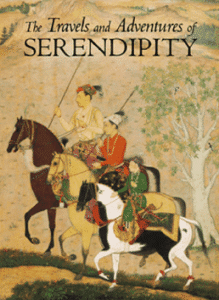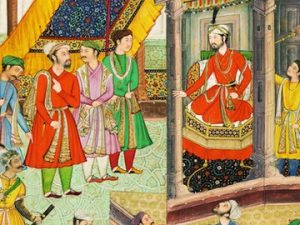The Three Princes of Serendip
“In ancient times there existed in the country of Serendippo, in the Far East, a great and powerful king by the name of Giaffer. He had three sons who were very dear to him. And being a good father and very concerned about their education, he decided that he had to leave them endowed not only with great power, but also with all kinds of virtues of which princes are particularly in need.”
The father searches out the best possible tutors. “And to them he entrusted the training of his sons, with the understanding that the best they could do for him was to teach them in such a way that they could be immediately recognized as his very own.”
When the tutors are pleased with the excellent progress that the three princes make in the arts and sciences, they report it to the king. He, however, still doubts their training, and summoning each in turn, declares that he will retire to the contemplative life leaving them as king. Each politely declines, affirming the father’s superior wisdom and fitness to rule.
The king is pleased, but fearing that his sons’ education may have been too sheltered and privileged, feigns anger at them for refusing the throne and sends them away from the land.
The lost camel
No sooner do the three princes arrive abroad than they trace clues to identify precisely a camel they have never seen. They conclude that the camel is lame, blind in one eye, missing a tooth, carrying a pregnant woman, and bearing honey on one side and butter on the other. When they later encounter the merchant who has lost the camel, they report their observations to him. He accuses them of stealing the camel and takes them to the Emperor Beramo, where he demands punishment.
Beramo asks how they are able to give such an accurate description of the camel if they have never seen it. It is clear from the princes’ replies that they have used small clues to infer cleverly the nature of the camel.
Grass had been eaten from the side of the road where it was less green, so the princes had inferred that the camel was blind on the other side. Because there were lumps of chewed grass on the road that were the size of a camel’s tooth, they inferred they had fallen through the gap left by a missing tooth. The tracks showed the prints of only three feet, the fourth being dragged, indicating that the animal was lame. That butter was carried on one side of the camel and honey on the other was evident because ants had been attracted to melted butter on one side of the road and flies to spilled honey on the other.
As for the woman, one of the princes said: “I guessed that the camel must have carried a woman, because I had noticed that near the tracks where the animal had knelt down the imprint of a foot was visible. Because some urine was nearby, I wet my fingers and as a reaction to its odour I felt a sort of carnal concupiscence, which convinced me that the imprint was of a woman’s foot.”
“I guessed that the same woman must have been pregnant,” said another prince, “because I had noticed nearby handprints which were indicative that the woman, being pregnant, had helped herself up with her hands while urinating.”
At this moment, a traveller enters the scene to say that he has just found a missing camel wandering in the desert. Beramo spares the lives of the three princes, lavishes rich rewards on them, and appoints them to be his advisors.
The story continues
The three princes have many other adventures, where they continue to display their sagacity, stories-within-stories are told, and, of course, there is a happy ending.

